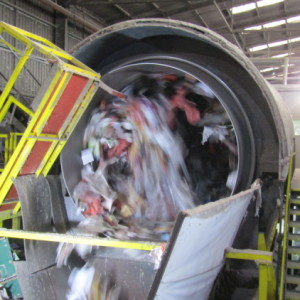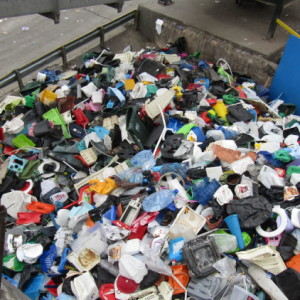Seagull Heaven!
We have two new team-members in the drawing office which is why we are currently on a short programme of site visits. It is so much easier to understand a facility by standing at its centre, and so much easier to produce a coherent drawing when you have a mental picture of what goes on there. So today we travelled in the opposite direction to witness the opposite end of the waste-management spectrum.
This is a MuRF – a Materials Recycling Facility. Some local councils will request that their residents sort paper from plastic and metal from glass, but you can't honestly expect every single householder to do that diligently and therefore it is necessary to have a facility to correct their errors. In which case, why ask them to do it at all? It would require more space for us to keep pre-sorted recycling from co-mingled recycling, so let's not bother asking residents to do our work for us and do it properly and professionally ourselves.
This plant sorts materials by type and then sends the sorted material to specialist plants. Although a significant amount of separation can be done by machine, we have a large human workforce using eyes, brains and hands to separate one material from another.
First the machines will remove glass. It has a greater density than the other materials and falls to the bottom when the whole mixed assortment is shaken vigorously and air is blasted across the top. It is important to remove glass as early as possible in the process because ground glass splinters cause a great deal of damage to the machinery; both the mechanical and human kind.
The glass we receive here has far too many impurities to be used to create beautiful household items from recycled glass; broken pieces still have sauce on the inside and paper on the outside and so it is taken to a place where it can all be ground into pieces no larger than 4mm in diameter and is used in the construction industry. In Britain it is used to make roads and in the Netherlands it is used as a layer between the ground and the floor of domestic housing projects.
Farther down the line plastic material is separated from paper material, I am not entirely sure how this happens and neither did I see the process which removes metal, but I can say that a great deal of separation is managed by a series of inclined conveyors which then drop their payload onto another inclined conveyor beginning a few metres below the top of the last. I believe that blasts of air as well as magnets play an important part in separating materials according to density.
Eventually the mechanically-sorted material reaches rooms where the conveyors run horizontally and a skilled workforce removes from the line anything passing them that does not belong on the line. I witnessed a team removing large pieces of cardboard from the paper line and another team removing non-recyclable plastic from the plastic line. Non-recyclable plastic includes flimsy supermarket bags and crisp packets with silver-coloured insides in case you weren't aware.
I would rather endure more chemo-therapy than work on those lines, yet the staff are happy. Really they are! Most are from Poland, Bulgaria, Roumania and Albania. Safety is the highest priority, followed by acceptable working conditions and job security. They work long shifts, but are employees not contractors, they have paid annual leave, they have sickness benefits. They have camaraderie and diligence. I got the distinct feeling that all of them take a pride in their work. They aren't there simply to exist through another shift. The company is helping to secure post-Brexit residency for all staff who need help with that.
Our Albanian guide told us that he had never envisaged himself working in a British recycling plant, but now that he is he couldn't be more happy nor more proud. He told us that defectors from our competitors are simply blown away by the company attitude. I was so very pleased to hear this. I think I have arrived in my natural home.
Main image; co-mingled recyclable material prior to sorting. The plant operates round the clock so this is a fairly constant level
Extra 1; sorting by density
Extra 2; glass ready to be prepared for the construction industry
Extra 3; plastic ready to be sent to our specialist plant
Extra 4; the kind of nonsense that some householders choose to put into their “kerbside recycling” bags. Precisely the reason that householders cannot be relied upon to do our sorting for us.




Comments
Sign in or get an account to comment.


